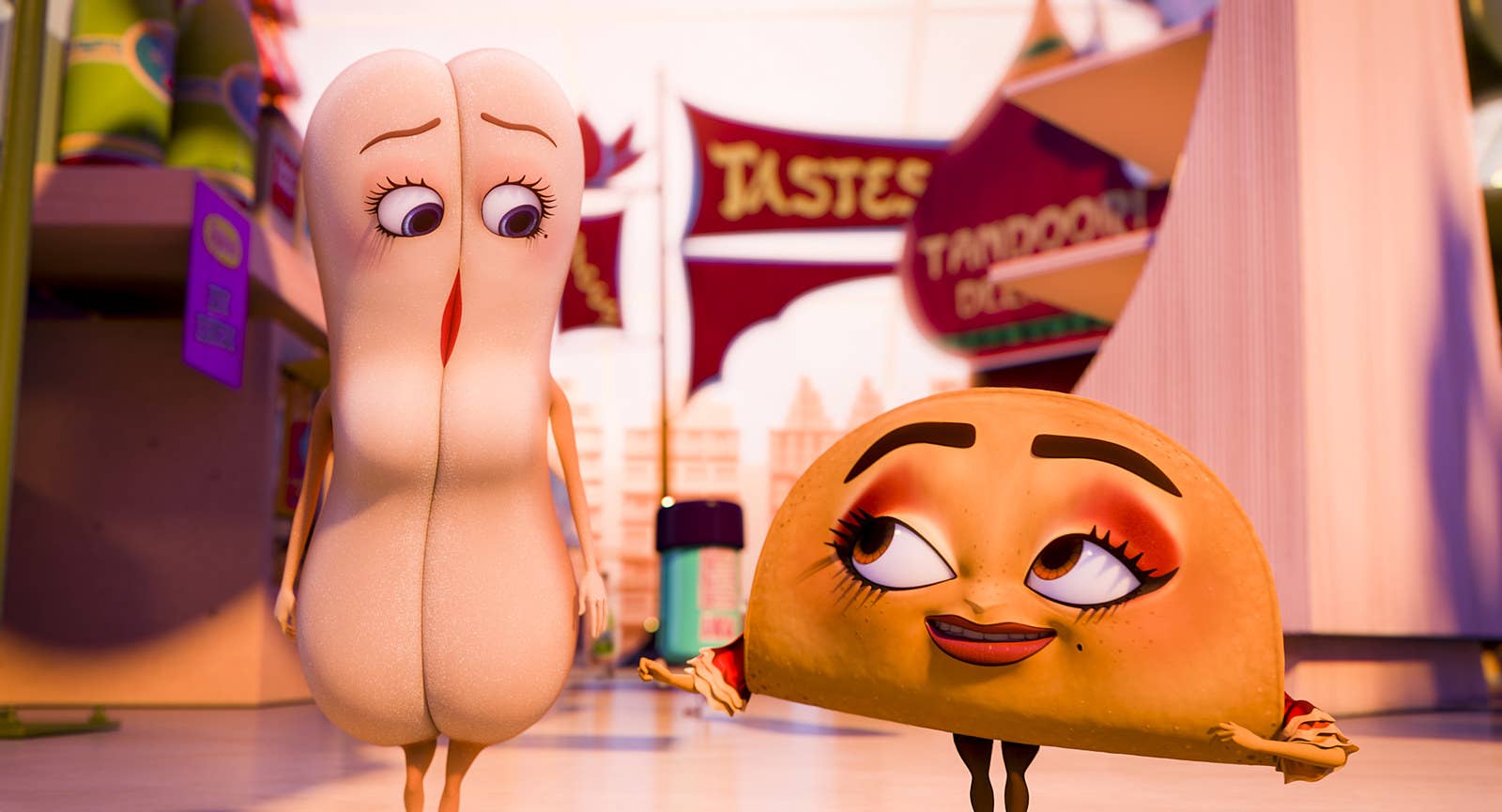
Seth Rogen and Evan Goldberg did not know what to expect when they stepped in front of 1,000-plus people at the 2016 SXSW Film Festival in March to introduce their newest movie, Sausage Party. The lifelong friends and creative partners had been working on the R-rated animated feature for 10 years and had stuffed it with more profanity, violence, drug use, sex, and envelope-pushing jokes about race and religion than any major animated film since 1999's South Park: Bigger, Longer and Uncut — or most live-action comedies, for that matter.
And on top of that, as Rogen and Goldberg nervously explained to the Austin crowd, some sequences in their anthropomorphized-food movie were still very much incomplete, including a bloody, no-holds-barred battle between the food that resides in a suburban supermarket and their human overlords who shop there and eat them, as well as the massive, graphic, dear-god-what-is-happening-right-now food orgy that serves as the film's, er, climax.
For anyone concerned, those are not much by way of spoilers — Sausage Party is the kind of film that truly needs to be seen to be believed.
And that night in Austin, it turned out, the vast majority of the audience were true believers. "Did you guys like the movie?" Goldberg asked the crowd after the screening; he and Rogen were joined by directors Conrad Vernon and Greg Tiernan and co-writers Kyle Hunter and Ariel Shaffir on stage. As the audience roared in approval, a sense of relief washed over Rogen and Goldberg.
During the Q&A that followed, one audience member prefaced his question by boasting, "Well, for one, I feel repulsed and blessed at the same time." Another wanted to know if the film had been approved by the MPAA: "How are y'all getting the big ol' fuck scene past them?"
"We did!" exclaimed Rogen. "You can show food fuuu-uuck!"
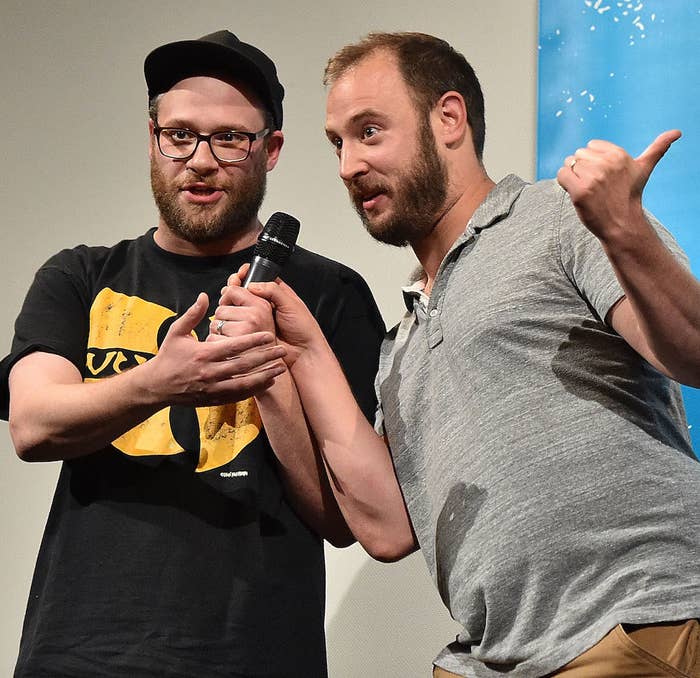
Roughly 10 minutes into the Q&A, however, a woman stepped up to the mic. With her voice comparatively muted, she started by praising the work of Salma Hayek, who voices Teresa, a lesbian taco shell. "But," she added, "who else did you use for your Mexican cultural references? Because I don't think that was represented very well in the film."
"Oh, the movie very much stereotypes every single cultural group," Rogen said, his trademark jackhammer laugh tightening in his throat.
"I know, I know," said the woman. "But I just want to know who was your reference other than Salma."
Rogen nervously talked over her, explaining that Teresa's scenes — which begin in the Mexican food aisle, reimagined as a dusty desert cantina — were meant as references to classic Westerns like The Wild Bunch. "Mostly very outdated," he said, laughing anxiously again.
Goldberg, a hint of irritation flashing across his face, jumped in. "To be very clear, not reality," he said. But the woman persisted, repeating her curiosity about the filmmakers' "Mexican cultural references," until, as is often the case with awkward moments during film festival Q&As, some in the audience began to jeer her. She sheepishly left the mic, and the moderator shifted to another question.
Four months later, sitting in a booth at Canter's Deli in Los Angeles, Rogen and Goldberg remembered that tense encounter — and the impact it had on their film.
"When that person said that, I remember being like, Fuck you, what do you fucking know?" Goldberg told BuzzFeed News. "And then five minutes later, it just sunk in. Like, oh, [she's] got a point."
"I remember getting quite flustered, because that doesn't happen very often," added Rogen. "I hope I treated [her] with respect. Because honestly, it was a valid note, and we listened to it. … The movie is a little different because of it."
For Rogen and Goldberg, the exchange was emblematic of their decade-long struggle to inject their bawdy, uninhibited sensibility into a Pixar-style animated movie — and the complicated creative risks they took in the process. Getting Sausage Party made at all was its own battle, but getting it made the right way involved a near-constant search for balance between wanting to push the boundaries of what an animated feature film can do, and stomping, pissing, and shitting all over those boundaries until audiences run screaming.
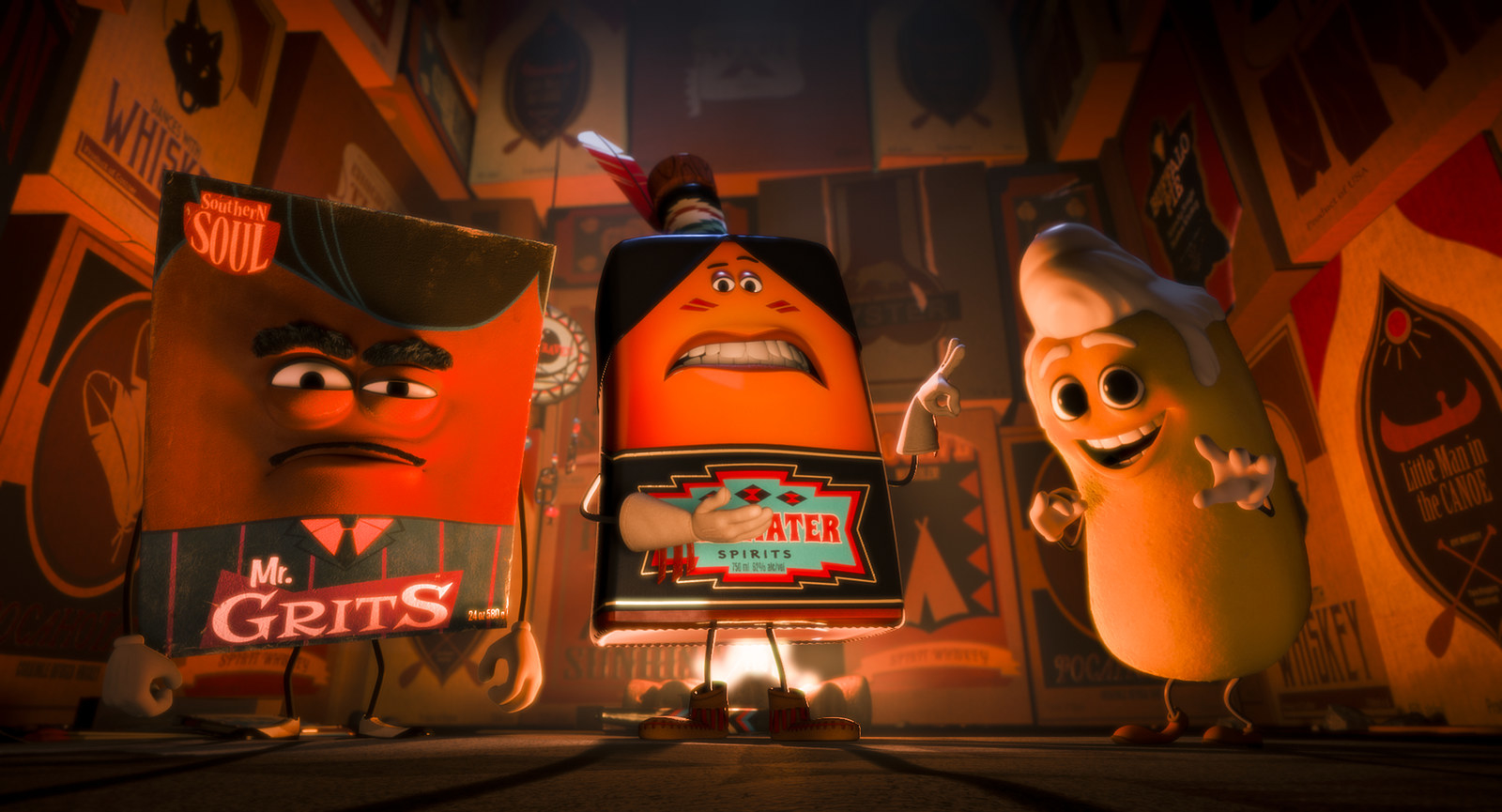
Of course, Rogen and Goldberg understand that an adult animated movie about horny, foul-mouthed, ethnically stereotyped food was never going to please everyone. They knew some people would be offended. But what they didn’t want Sausage Party to be was hateful.
"People talk a lot about freedom of speech, and what they forget is, like, yeah, you can make whatever joke you want," said Rogen. "And people have the right to be offended by any of those jokes. You can either accept that that's always going to happen, or stop doing it. And if you feel like it's happening more than it's not, and you're being branded as someone who's mean or reductive to society in some ways, then you should analyze that."
And that's exactly what Rogen and Goldberg tried to do in the decade it took to bring Sausage Party to the screen. Teresa Taco, for example, was originally introduced via a villain named El Guaco, a pun-obsessed warlord who ruled over the Mexican food aisle and physically assaulted Teresa and the film's main heroine, Brenda Buns (Kristen Wiig); now, El Guaco only appears briefly for a joke about getting hit in his “guac and balls.” A character voiced by Craig Robinson was initially called Uncle Tom's Rice, and his dialogue was written in an unmistakable plantation patois; in the final film, however, his name was changed to Mr. Grits, and his delivery adjusted from the 19th century to the 21st.
“If people were just like, ‘This is fucked and hurtful, don’t do it!’ — we’re not the guys who are like, ‘Fuck you! We’re doing it anyway!’”
Rogen and Goldberg were acutely aware that they were wading into tricky waters of representation as straight white men. "We know what good Jew jokes there are, and we know good Canadian jokes. And the white person jokes, I suppose," said Goldberg. "We know what we aren't, and what other people are, and that they'll have a better insight."
So when they were facing down a joke that fell outside of their own life experience, they'd ask someone closer to the material. "I would call Jerrod Carmichael and be like, 'So we're going with Mr. Grits now. What are your thoughts?'" said Goldberg.
Carmichael, who first heard about Sausage Party while working with Rogen and Goldberg on their 2014 comedy Neighbors, remembered it a bit differently. "Evan's favorite thing to text me during the making of this [movie] was 'Is this racist?'" he said with a chuckle. "And my answer was always 'No. Just go for it.' It's not malicious. They are cautious to make sure that they don't just unnecessarily offend anyone. They're so aware of it. It's not just empty. It's not just for the sake of saying things."
Rogen and Goldberg put just about every joke through that kind of vetting process. "If there's anything that people were overwhelmingly just like, 'This is fucked and hurtful, don't do it!' — we're not the guys who are like, 'Fuck you! We're doing it anyway!'" said Rogen. "We don't want to hurt people's feelings. But from my experience, generally, if it's funny and it's not hurtful, people are happy to be included in the arena rather than upset that they're included in the arena. … There's some comedy where you feel like, Oh, that person's actually a little racist, maybe. And we do not want to make that comedy. So we very much jump through as many of our own self-imposed hoops as possible in order to really be able to tell ourselves that as far as we're pushing it, we come down on what we hope is the right side of this stuff. At least, to us."
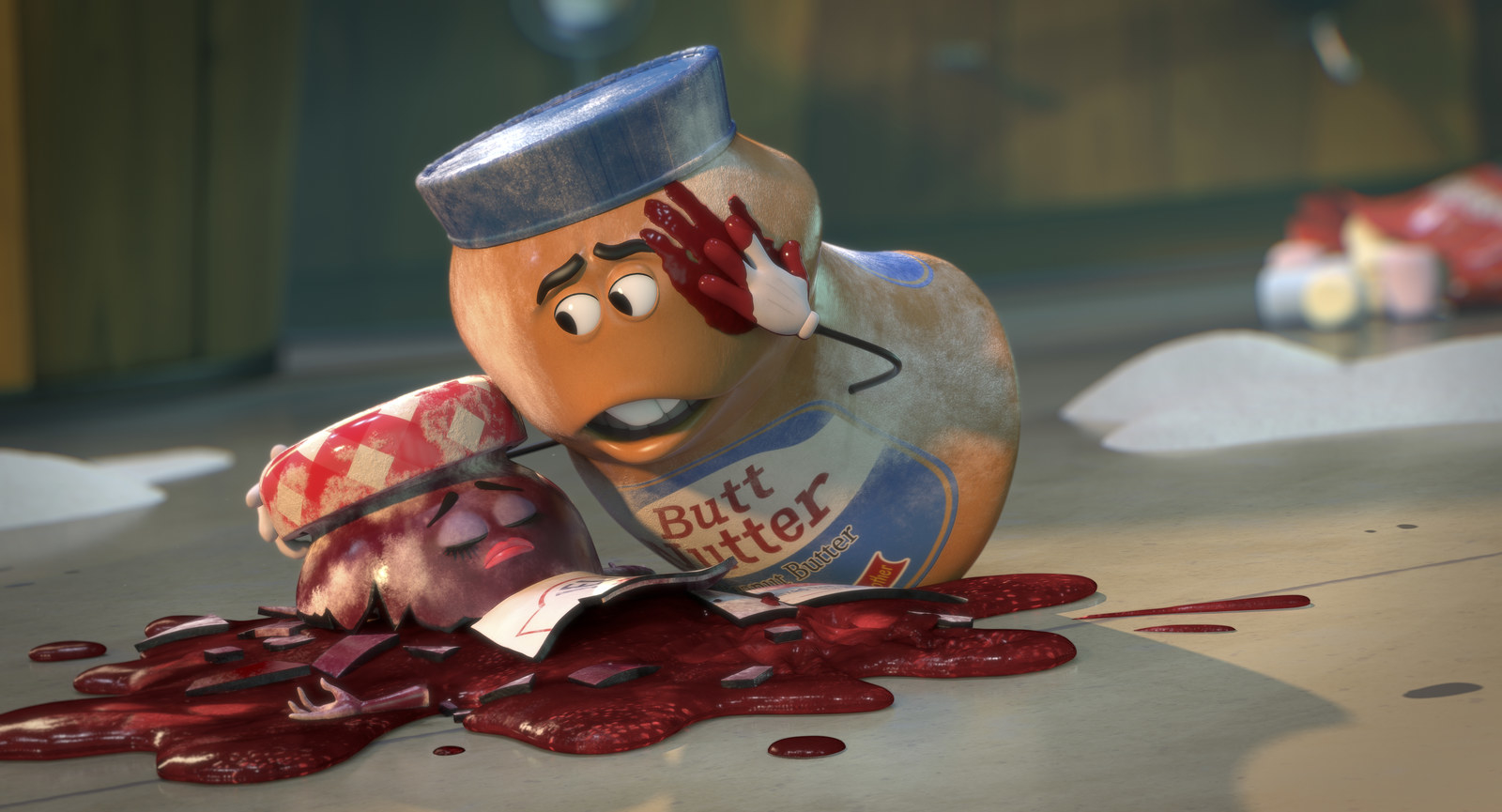
The self-imposed hoop-jumping began in 2006, when Rogen and Goldberg first had the idea to make an R-rated CG animated movie. "We just started getting into how the things we do to food in an everyday way in the context of a Toy Story–type animated movie is actually, like, horrific — and quite funny," said Rogen.
They also recognized that since food is inherently cultural, making a movie that imbued its edible characters with backstories and identities would necessitate playing to certain stereotypes. "There are literally Asian aisles and Jewish aisles and halal aisles," said Goldberg. "It's just there."
As Rogen explained, in animation, "a lot of the jokes come from projecting what you would assume this thing's personality is based on your use for it, or its appearance." He specifically cited Pixar’s Cars franchise: "The VW bus is the hippie! The Fiat's a little Italian guy! The tow truck is a redneck!"
At the time, Rogen's and Goldberg's careers were just starting their upward trajectory, so Sausage Party remained dormant as an eye-catching logline — "a bunch of hot dogs want to escape their packaging to go fuck buns" — until Rogen voiced a character in the 2009 DreamWorks Animation film Monsters vs. Aliens and pitched the movie to one of the film's directors, Conrad Vernon.
“The movie is as uncensored a thing as I’ve ever seen.”
As a decades-long devotee of the adult-skewing animated classic Heavy Metal, Vernon was hooked immediately. "For DreamWorks, we do our own gags that are very R-rated," he said in a phone interview. "We just know they're never going to make it in the movie." Vernon jumped at the opportunity to, as he put it, "cut loose and do some really funny, dirty, R-rated gags and say, 'This could be in this movie.'"
Soon after, he flew to Vancouver to conscript Greg Tiernan, who runs the independent animation production house Nitrogen Studios Canada with his wife, Nicole Stinn. They were producing the pointedly G-rated children's program Thomas & Friends, but Conrad knew Sausage Party would be up Tiernan's alley. The two met working on 1992's Cool World, which was originally envisioned by iconoclastic animator Ralph Bakshi (Fritz the Cat) as a breakthrough R-rated animated feature, before it was ultimately overhauled by the studio to make it suitable for a PG-13 rating.
"The industry sees animation as a genre rather than a medium," said Tiernan. "It has been pigeonholed into being just for kids' entertainment and that's it."
Like a cartoon coyote, Rogen and Goldberg hit that brick wall head-on. After they finally hammered out a script for Sausage Party on the set of their 2010 cancer dramedy 50/50, they were rejected by every studio in town.
"What was so weird to us is that everyone acted like an adult cartoon was fucking a bonkers idea, and we were like, what are the most successful cartoons on television?" said Rogen. "South Park. The Simpsons. Family Guy. Every cartoon that people watch is an adult cartoon on television. So how come in movies, it's such a weird, obscure idea?"
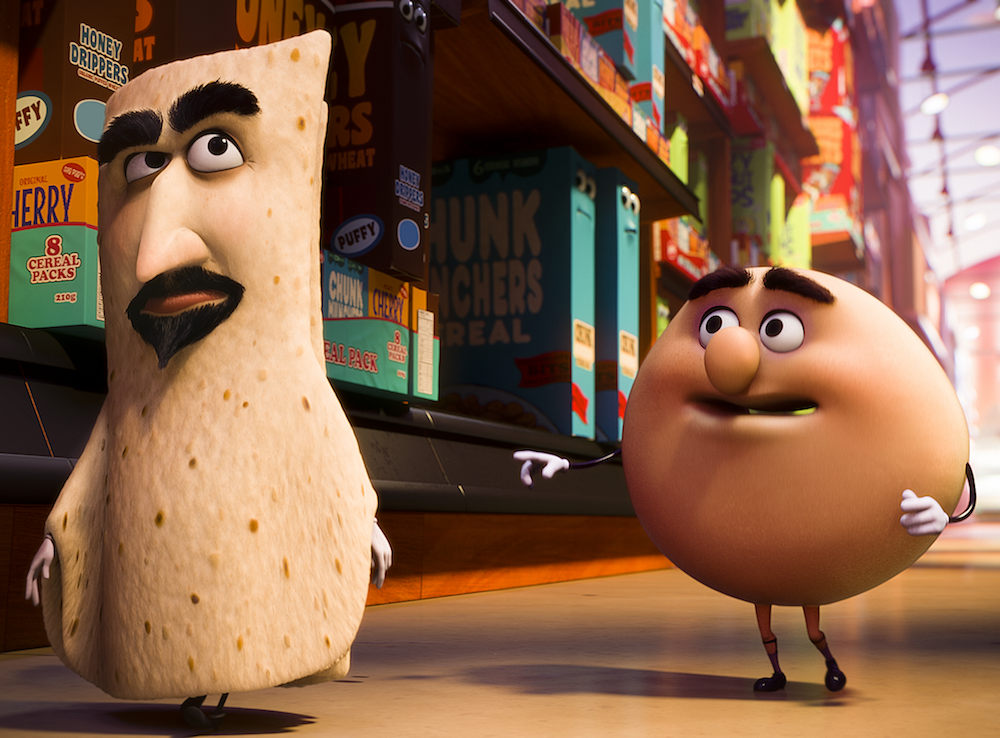
But there was no example of a computer-animated R-rated feature to point to that would indicate how well their film might do at the box office, let alone how they could pull it off. "When we were pitching this movie, no one would know what it would look like," said Vernon. "I told my friends about this, and even some of them were going, 'Wait a minute — in a theater? How's that going to work?'"
To gin up industry interest, Rogen and Goldberg hosted a series of script readings. As early as 2010, Goldberg and executive producer Jonah Hill — who also voices a hot dog and gets a “story by” credit — began talking about the movie to the press. But it still took until 2013 for Megan Ellison's upstart production company Annapurna Pictures to sign on to co-finance the film, with Sony Pictures distributing, on a mighty lean $19 million budget.
The meager resources, however, had a major upside: The filmmakers were left alone to make Sausage Party the way they saw fit.
"The movie is as uncensored a thing as I've ever seen," said David Krumholtz, who has known Rogen and Goldberg for years, and who voices Lavash, a Muslim piece of flatbread with a goatee. "If they were going to have to water down a movie called Sausage Party, there was no point in doing it. It was going to have to be everything they wanted it to be."
That freedom, however, proved to be as precarious as it was promising.
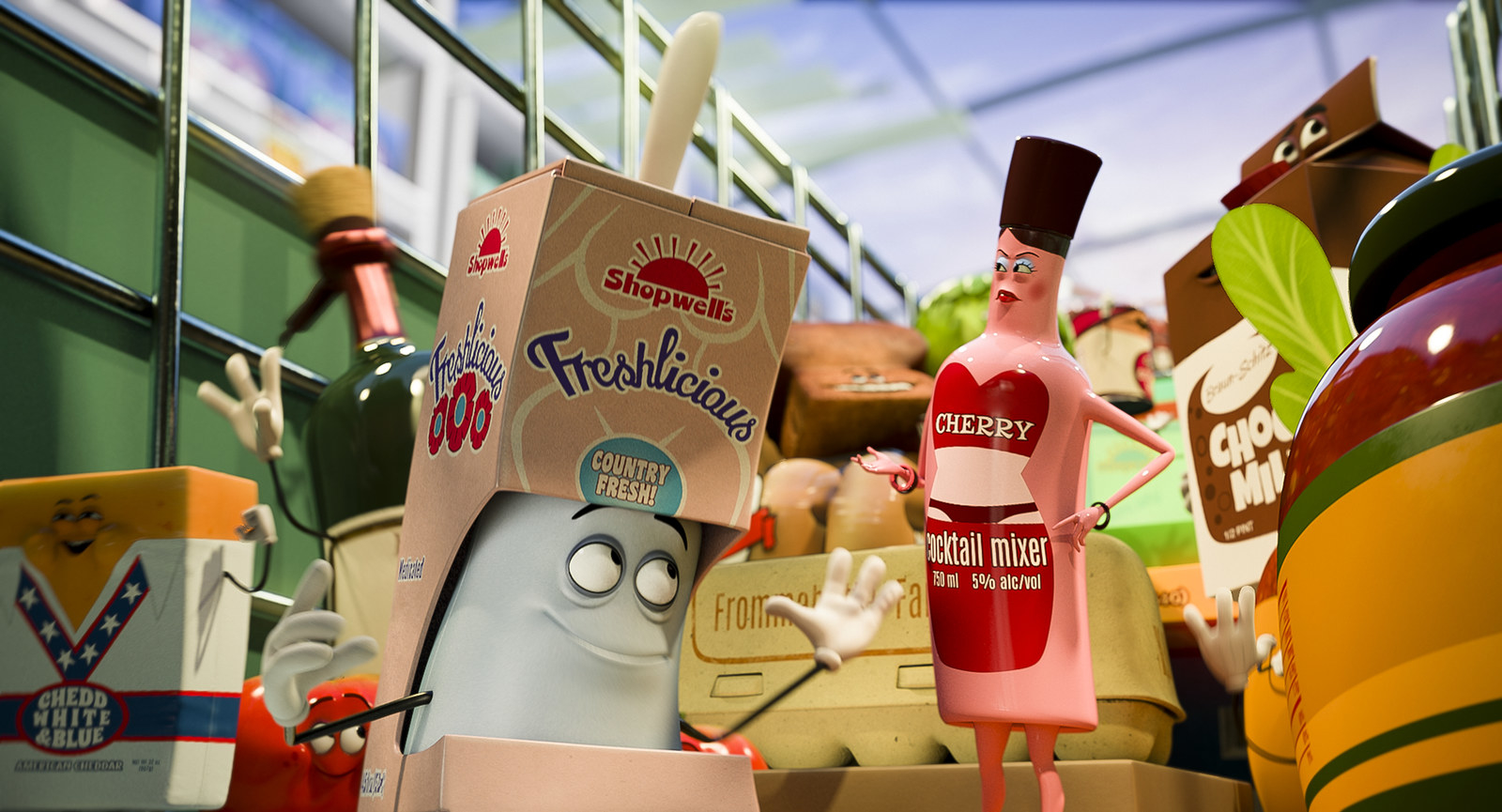
The creative process for the Sausage Party filmmakers necessitated pushing the envelope to its breaking point. As Goldberg put it, "You have to go too far, and then pull it back." Any artistic endeavor involves some trial and error, but figuring out how far was "too far" in the under-explored creative territory of an adult animated feature led the filmmakers down some considerably dark alleys.
The movie's main villain, Douche, voiced by comedian Nick Kroll, went through a radical change from how he was initially conceived. "They had written him originally as more of what would be considered a classic Disney villain, like a Jafar or Ursula," said Kroll. He commanded a horde of rats that wreaked havoc throughout the supermarket — and because there was no studio executive telling the filmmakers to limit Douche's depravity, they decided to make him disturbingly close with his minions. "At one point he was fingering the rat's, um…well…he was fingering the rat's butthole," said Kroll. "That's the most tactful way I can describe it."
Compounding things further, Douche then used his soiled finger to torture Lavash by forcing it in his mouth. "I remember at every table read, it would get a collective groan from everyone," said Krumholtz. "It was like, 'My god, how are they going to animate that? What is it going to look like?'"
A few hundred unsuspecting New Yorkers found out the answers to those questions when the filmmakers screened a rough version of Sausage Party in December 2014. At that point, the film was nothing more than a series crudely animated storyboards, but Rogen was convinced it was necessary to screen it for a test audience after an encounter he and his wife had with, of all people, Kanye West.
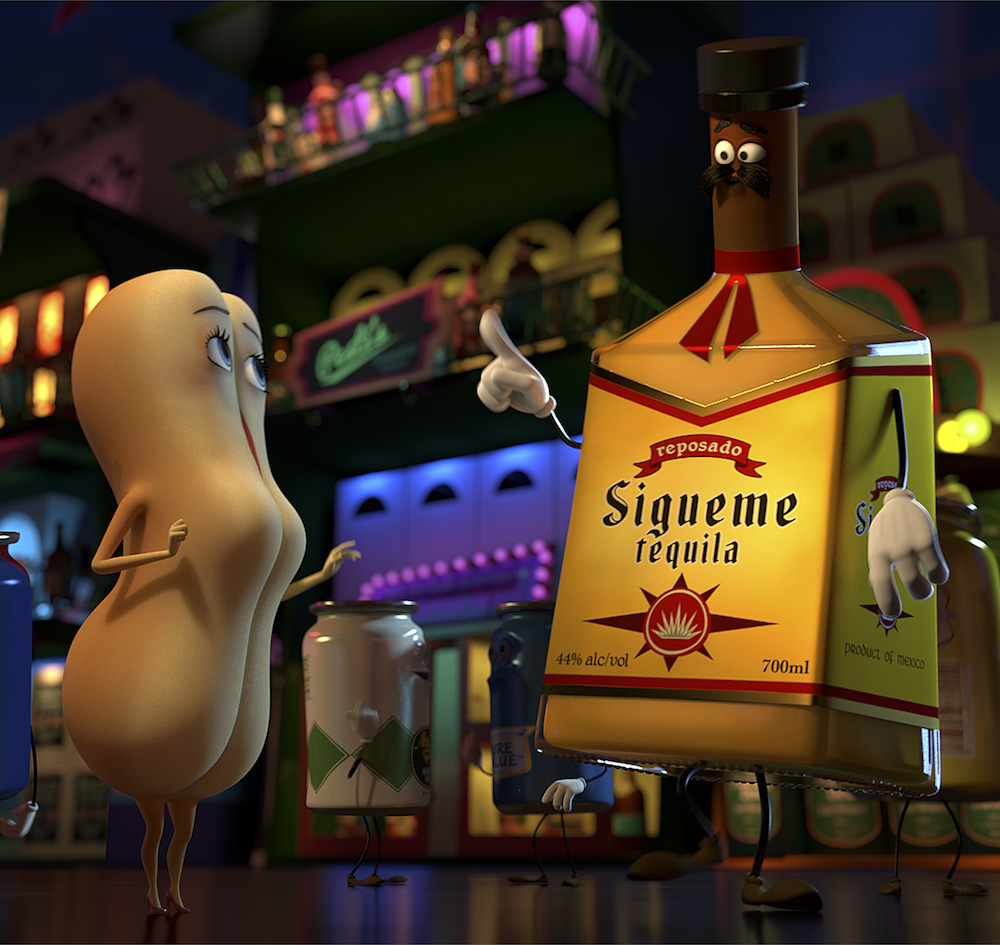
"He basically rapped to us an entire album live that is not The Life of Pablo," said Rogen. "I remember coming back from that experience being like, Kanye West is getting way more input than we're getting, and he's a lot more talented than we are! Like, we should be really aggressively seeking as much input on [Sausage Party]."
So thanks at least in part to Kanye, a small Soho crowd got to watch a storyboard version of the rat scene, and their reaction was so much worse than some groans at a table read.
"There's this sound that is the worst you can get in a test review," said Goldberg. "When people say, like, 'My fans and I have a trust' — it's when you horribly betray that trust [that] people make this one godforsaken noise. … That is what I think they call an epic fail?" It wasn't just that once scene, either. In a focus group afterward, Douche was everyone's least favorite character overall — the audience found him out of step with the film's contemporary, Pixar-ian sensibility. By screening Sausage Party so early, however, the filmmakers were able to course-correct with a top-down rewrite of the character. They lost the rats completely, dialed back the Disney-style theatrics, and made him much more like a classic obnoxious — for lack of a better word — douche.
An early draft of the script obtained by BuzzFeed News makes clear that Douche's makeover was hardly the only time the filmmakers dialed back a creative choice they ultimately realized went too far. For example: Lavash was, as he is in the final film, a provincial Muslim caricature who is constantly at odds with the nebbish Sammy Bagel Jr. (voiced by Edward Norton doing an uncanny Woody Allen impression). But Lavash was originally doomed to a premature death due to mold, so during the film's climactic battle between food and humans, Lavash sacrificed himself by forcing his body down the throat of a rabbi.
"There's also a version where he thinks he's going to die, shoves himself down the throat of the rabbi, and then bursts out of the rabbi's stomach," said Krumholtz. "Um. That didn't make it in either."
“We achieved a life goal: We made Sacha Baron Cohen uncomfortable.”
Some adjustments came out of early test screenings, but a lot were based on feedback the filmmakers received from their peers. At one point, Rogen and Goldberg invited a small mob of comedy heavyweights like Judd Apatow, Sacha Baron Cohen, and Phil Lord and Chris Miller to screen a rough version of the film at their production company offices on the Sony lot. "I remember thinking, My goodness, this room is filled with 30 of the smartest funny people in town!" said Lord. "Every once in a while, I was like, 'Oh, that's just crude and not funny,' and so I would call that stuff out from a comedy standpoint. If it's crude and it's insightful, and makes you laugh in spite of yourself, or it makes the audience react in a big way and feel embarrassed and shocked — that can be great."
According to Tiernan, Baron Cohen thought Lavash killing a human rabbi "might be going a bit too far," which delighted Goldberg to no end. "We achieved a life goal: We made Sacha Baron Cohen uncomfortable," he said with a giant grin. "It was the best." (Baron Cohen was unavailable for an interview for this story.)
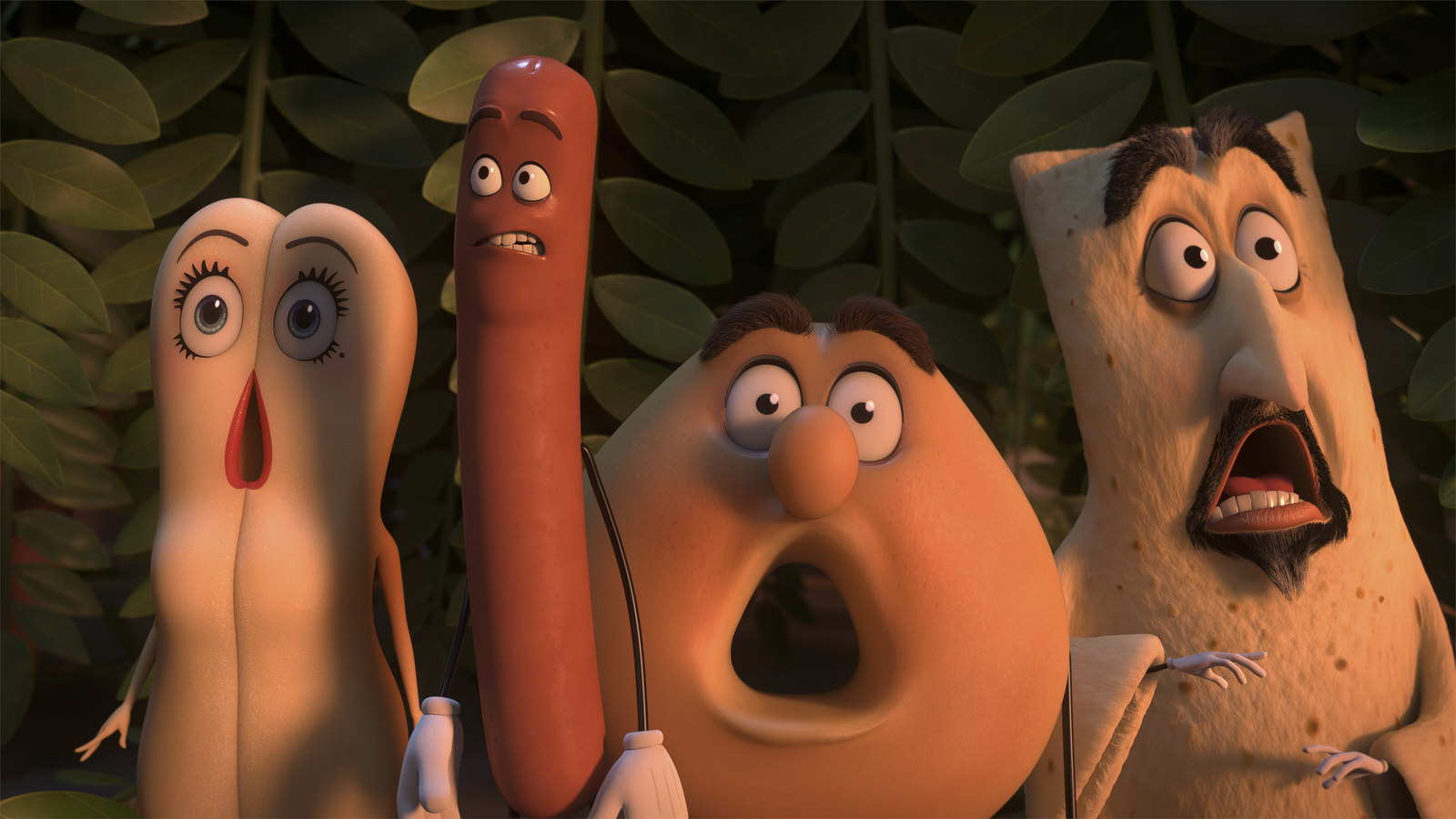
The open-source approach to their creative process also paralleled the evolution of Sausage Party's larger message about faith and belief, as the main hero, Frank (voiced by Rogen), begins to challenge the supermarket creed that they go to an orgiastic heaven when their human gods select them to leave the store — as opposed to the reality that they’re horribly mutilated and eaten. "[The earlier version] was probably a lot more critical outwardly of faith and belief in general," said Rogen. "As we got older throughout the 10 years of making the movie, I think we really became more accepting of a lot of things. My character specifically has to learn the lesson not to just shit all over people's beliefs."
But the process of constant feedback and self-reflection did not make Sausage Party less potentially controversial; actually, quite the opposite. "It seemed like every incarnation [of the film] got more offensive, more confrontational in tone and in subject matter," said Krumholtz.
While Rogen and Goldberg have spent the better part of a decade diligently trying to keep their film from crossing the line, they still gleefully race as close to the edge of it as they can. Even the changes they made to Sausage Party after that tense exchange at SXSW — which included adding in an almost self-aware line from Frank that "we shouldn't be focusing on each other's differences in immature ways" — can only go so far. "I'm not saying that same person would watch the movie and not have all the same problems," Rogen said, bursting with laughter. "In fact, I can almost guarantee you they would."
Besides, for the men whose comedy The Interview ostensibly caused the Sony Pictures hack two years ago, what's a little social media outrage? "When you've agitated a nuclear power with your comedy," said Rogen, "like, some angry people online is not, to us, something we put a ton of weight in." •
